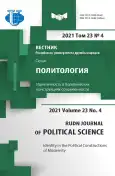Not the Far-Right Only: Which Parties Occupy the Niche of Cultural Protectionism in the EU Countries?
- Autores: Petrov I.I.1
-
Afiliações:
- HSE University
- Edição: Volume 23, Nº 4 (2021): Identity in the Political Constructions of Modernity
- Páginas: 692-705
- Seção: IDENTITY IN EUROPE AND ITS ACTORS
- URL: https://journal-vniispk.ru/2313-1438/article/view/322103
- DOI: https://doi.org/10.22363/2313-1438-2021-23-4-692-705
- ID: 322103
Citar
Texto integral
Resumo
In the 2010s many moderate parties in Europe began to use the agenda of the far-rights, competing with them on the same field. This article is devoted to the problem of inter-party competition in European countries amidst the rise of far-right parties. We also intended to check if the far-right profile is the same for all EU countries. To achieve the goal of the study, we used two databases on party positioning - MARPOR (Comparative Manifesto Project) and CHES (Chapel Hill Expert Survey). The study revealed that the consolidated family of the far-rights exists only in the countries of North-Western Europe, while in the countries of East-Central Europe the agenda of the far-rights is less consolidated and regionally heterogeneous. The mainstream competitors of the far-rights included mostly conservatives in North-Western Europe, and various parties, including the Social Democrats, in East-Central Europe. The study confirmed the hypothesis about the serious influence of the far-rights on mainstream politics. At the same time, it questioned the traditional approach which attributes the far-right profile only to far-right parties and ignores both regional differences and the factor of spatial competition.
Sobre autores
Ivan Petrov
HSE University
Autor responsável pela correspondência
Email: iip95@yandex.ru
ORCID ID: 0000-0003-3856-2503
postgraduate at the Postgraduate School of Political Science
Moscow, Russian FederationBibliografia
- Abou-Chadi, T. (2016). Niche party success and mainstream party policy shifts–how green and radical right parties differ in their impact. British Journal of Political Science, 46(2), 417–436.
- Adams, J. et al. (2006). Are niche parties fundamentally different from mainstream parties? The causes and the electoral consequences of Western European parties’ policy shifts, 1976–1998, American Journal of Political Science, 50(3), 513–529.
- Arzheimer, K. (2009). Contextual factors and the extreme right vote in Western Europe, 1980–2002, American Journal of Political Science, 53(2), 259–275.
- Bakker, R. et al. (2015). Measuring party positions in Europe: The Chapel Hill expert survey trend file, 1999–2010, Party Politics, 21(1), 143–152.
- Bale, T. (2003). Cinderella and her ugly sisters: the mainstream and extreme right in Europe’s bipolarising party systems, West European Politics, 26(3), 67–90.
- Benoit, K., & Laver, M. (2006). Party policy in modern democracies. Routledge.
- Dalton, R.J. (1996). Political cleavages, issues, and electoral change, Comparing Democracies: Elections and voting in global perspective, 2, 319–342.
- De Vries, C.E., & Hobolt, S.B. (2012). When dimensions collide: The electoral success of issue entrepreneurs, European Union Politics, 13(2), 246–268.
- Green-Pedersen, C. (2019). The Reshaping of West European Party Politics: Agenda-Setting and Party Competition in Comparative Perspective. Oxford University Press.
- Hooghe, L., & Marks, G. (2018). Cleavage theory meets Europe’s crises: Lipset, Rokkan, and the transnational cleavage, Journal of European Public Policy, 25(1), 109–135.
- Hutter, S., & Kriesi, H. (Eds.). (2019). European party politics in times of crisis. Cambridge University Press.
- Inglehart, R.F., & Norris, P. (2016). Trump, Brexit, and the rise of populism: Economic have-nots and cultural backlash.
- Kitschelt, H., & Rehm, P. (2015). Party alignments. Change and continuity. In P. Baramendi et. al (Eds.), The politics of advanced capitalism (pp. 179–201). Cambridge University Press.
- Lipset, S.M., & Rokkan, S. (1967). Cleavage structures, party systems, and voter alignments: an introduction. Free Press.
- Makarenko, B.I. (2015). Parties and party systems: modern tendencies of development. Political encyclopedia. (In Russian).
- Makarenko, B.I. (2018). Populism and political institutions: comparative perspective. Populism as common challenge. In B.I. Makarenko & N.V. Petrov (Eds.), Political encyclopedia (pp. 27–36). Moscow. (In Russian).
- Mudde, C. (2013). Three decades of populist radical right parties in Western Europe: So what? European Journal of Political Research, 52(1), 1–19.
- Mudde, C. (2019). The far right today. John Wiley & Sons.
- Norris, P. et al. (2005). Radical right: Voters and parties in the electoral market. Cambridge University Press.
- Okuneva, L.S., & Tevdoj-Burmuli, A.I. (Eds.). (2020). Right populism: global trend and regional features. Moscow: MGIMO-University. (In Russian).
- Oskolkov, P.V., & Tevdoj-Burmuli, A.I. (2018). European right-wing populism and nationalism: revisiting the correlation of features. Bulletin of Perm University. Political Science, 3, 19–33. (In Russian).
- Sergeev, E.A. (2020). Economic programs of Dutch right populists. In L.S. Okuneva & A.I. Tevdoj-Burmuli (Eds.), Right populism: global trend and regional features (pp. 104–121). Moscow: MGIMO-University. (In Russian).
- Shein, S.A. (2020). Responses of European mainstream to right-wing populism challenges from the perspective of the resilience concept: Case of the United Kingdom. RUDN Journal of Political Science, 22(1), 59–70. (In Russian).
- Volkens, A. et al. (Eds.). (2013). Mapping policy preferences from texts: statistical solutions for manifesto analysts. OUP Oxford, 3.
Arquivos suplementares









